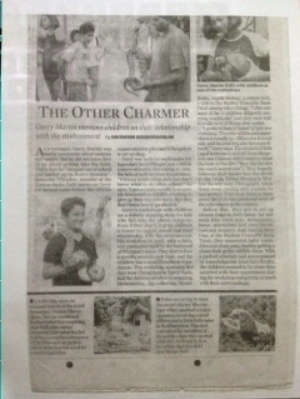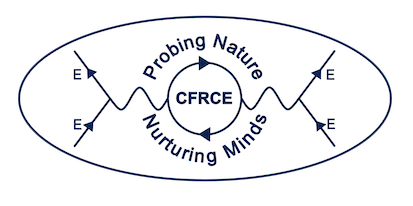Abhinav K: Accomplished Roboticist from 11th Grade

He came accompanied by his parents.
"Welcome! What can we do for you?" the Director asked.
The parents looked at their son. He looked at them in turn not knowing what to speak.
"Would you like to speak to us or him?" asked the father.
"That is for you to say," the director smiled, trying to ease the conversation. "Perhaps, you can speak together with him, and then separately, if you so wish."
"His studies has deteriorated very much this year," his mother ventured.
"He secured an A1 in his 10th grade....but..." his father added.
"Abhinav, why don't you speak about the problem?" his mother prompted.
Abhinav responded, "...the teaching is very bad...especially in Chemistry. I have secured only 22% in the recent test."
"They have given you only 22% is it?" Asked the Director.
"Yes..." Nodded Abhinav in agreement. "The teachers are very bad...they actually read out what is there in the book. I can manage Physics and Math but Chemistry requires so much of memorization...I just cannot mug up. If I don't understand something, I can't learn. And they give hundreds of problems every day."
"We put him in that integrated program thinking we could save time," his father spoke, "he can finish his classes and the coaching at one place. He would save so much travel time. The teachers are the best available. He is putting in a lot of effort. But his scores are falling. In the recent Parent Teachers Meeting, they told us he is not putting enough effort. It is ok for the board exams but not for the competitive exams."
"But, dad, I told you that requires 28 hrs a day," Abhinav retorted.
"Abhinav, don't dodge the issue. Please tell the problem", his mother pleaded.
"Sir," Abhinav turned to the Director, "if I add up all the time requirement according to their timetable, I see that it is possible only if we have 28 hrs a day. I am doing my best. But I just can't score."
"But, Abhinav, how are your friends doing better?" His father asked.
"Dad, they are also in trouble. The teachers say the same thing to each one. But each of their parents thinks it is they alone who have the problem."
"Abhinav, you did so well in the 10th grade," his mother reminded him.
"Sir, we are sorry, we only are talking," his father said. The three fell silent.
"Abhinav, what is your learning strategy?" Asked the Director.
"I study according to the timetable," Abhinav replied.
"But how do you learn?" the Director repeated.
"I study as much as possible..." Abhinav looked puzzled.
"I don't mean your study strategy, I am asking about your learning strategy," the director smilingly added.
"I don't understand," Abhinav commented.
"Studies and Learning are two entirely different things," the director explained, "you may study as much as you wish but that need not at all result in learning. Likewise, you may learn everything without studying anything at all."
"But how can one learn without studying?" Abhinav's mother was incredulous.
"Well, madam, you have such a musical voice," the director diverted her.
"Oh, I am a musician. I perform and also teach music." Her face lit up with joy as she said that.
"I am sure you must have read a huge number of books and studied day and night for that," the director commented.
"Oh, no, nothing like that. You cannot learn music like that. You have got to practice."
"Oh, is that so," the director seemed to be thinking. "Well, maybe, in music it is different. But I am sure most of the things in life one learns by studying."
"Sir, hardly so," Abhinav's father said. "On the contrary, we pick up by experience."
"Exactly," the director spoke, "experience is the word. Now, studying is not the way to experience learning. There are so many better ways than that."
"Really?" Abhinav's mother seemed surprised.
"Of course," the director said. "You see this file. It contains lots of illustrations of comics."

The parents took the file and opened it. "What amazing work," they commented.
"It was done by a student in the 7th grade," the director spoke, "the boy was not interested in studies at all. He found it boring and dull. We found a way for him to learn in a very powerful manner. As a result, he did this work and all the learning was a byproduct of tremendous enjoyment. He did not study anything at all. He learned everything by this kind of activity. He became so good in his formal academics that all his problems at school disappeared. His grades shot up. Not only that. As he was interested in wildlife, he wrote to Gerry Martin and was invited to his farm. He carried a python, washed a crocodile, extracted one of its broken teeth, and did so many things. Here's a report as it appeared in the newspaper.
"You can read about him on our web in the "Success Stories" page. But for now, the summary is that study is a poor way to learn."
"I would love to learn like that," Abhinav was enthusiastic.
"Everybody who comes to CFRCE learns in like that, in their own, uniquely powerful manner," the director affirmed.
"So, can he begin?" Abhinav's father asked.
"I cannot say that yet. He will have to go through our admission process," the director replied.
"Oh, is there a selection?" His mother asked.
"Yes, it is to make sure that the student comes with a self-drive. And also to screen off many who mistake our powerful mentoring to be like so-called "tuitions." They are poles apart. We look for those who have at least an understanding of our philosophy and methods. This is necessary to achieve those extraordinary heights of excellence we aim at.
A week later, Abhinav successfully secured admission into the mentoring program. The directors developed a strategy unique to Abhinav who was in fact deeply interested in Robotics. Abhinav began to see that everything he had to learn was in one way or the other, intimately related to Robotics. Even Chemistry was so related. He became interested in the chemical composition of the particular metals needed to frame the robot-body. And then, whether it was possible to use particular chemicals to mimic the human nervous system by artificial neural networks. He saw that biology had a key role to play in bringing out the differences between an animal and a machine via natural selection on one hand and competitive differentiation on the other hand. He simultaneously got interested in the economics of Nature and of human commerce.
Trying to come to grips with the mathematics of robotics, he realized that Calculus had an important role in determining optimal trajectories for a machine intelligence. His passion for mathematics soared sky high.
One of the major facets of the CFRCE mentoring program is personal development as the leverage for technical learning. Abhinav had already been guided through several processes including optimal planning, goal setting, visualization and inner game techniques. He suddenly understood why these were indispensable in reaching extraordinary levels of learning. The conventional methods of learning relied on the bullock-cart methods of conscious learning and tunnel-vision. He was, on the contrary, learning the rocket-speed techniques of subconscious massive learning of broadband-vision. Month by month his achievements shot up. As he took up the SAT exam, his scores leveled at 800 out of 800. Before he had even touched the month of December, he had been offered admission in three premier United States Universities belonging to the top ten category. And a huge special award of around eighty thousand dollars from one of them.
Abhinav had succeed in actualizing his deepest potential. Instead of becoming anxious and applying for various examinations, he could chose to be completely at peace, pursuing his favorite robotics. Perhaps he was the only one who applied for no other competitive exams but continued to work away on his passion. Abhinav had truly realized his childhood dream of being a roboticist.
